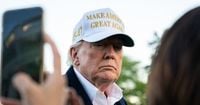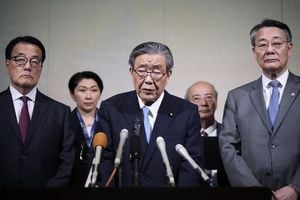On April 30, 2025, the United States and Ukraine announced a significant economic deal following weeks of pressure from President Donald Trump for Ukraine to compensate the U.S. for billions in military and economic assistance aimed at repelling Russian aggression. Treasury Secretary Scott Bessent highlighted the partnership's potential to unlock Ukraine's growth assets, mobilize American talent, and improve the investment climate in Ukraine. In a video posted to the social media platform X, Bessent stated, "This partnership allows the United States to invest alongside Ukraine, to unlock Ukraine’s growth assets, mobilize American talent, capital, and governance standards that will improve Ukraine’s investment climate and accelerate Ukraine’s economic recovery."
Ukraine’s Economy Minister Yulia Svyrydenko confirmed the deal's signing in Washington, emphasizing that it aims to attract global investment to Ukraine. The announcement comes as Trump marks the 100-day milestone of his second term, during which he has aggressively pursued foreign policy initiatives, including the recent economic agreement with Ukraine.
During this Cabinet meeting, Trump also addressed the nation's economic concerns, following a report from the Commerce Department indicating that the U.S. economy shrank by 0.3% in the first quarter of 2025, the first decline in three years. Trump attributed the economic downturn to the policies of former President Joe Biden, stating, "We took over on January 20, and I think you have to get us a little bit of time to get moving, but this is the Biden economy." Despite these challenges, Trump insisted that he is not taking credit or blame for the stock market's performance, which has seen significant volatility amid his administration's tariff policies.
In a related development, Senate Democrats are pushing for a vote on whether to block the global tariffs that Trump announced earlier this month. These tariffs, which cover nearly all U.S. trading partners, have sparked concerns among businesses and consumers alike as they brace for higher prices and potential shortages. Jim Farley, CEO of Ford Motor Company, welcomed revisions to auto import rules but noted that more work is needed to create trade policies that promote growth in the U.S. auto industry.
On the immigration front, the Trump administration faced scrutiny as a federal judge directed officials to provide information on their efforts to retrieve Kilmar Abrego Garcia, a Maryland man mistakenly deported to El Salvador. Secretary of State Marco Rubio, during the Cabinet meeting, stated that he would never disclose details about the administration's discussions regarding Abrego Garcia, reinforcing the notion that foreign policy decisions are reserved for the executive branch.
Also on April 30, a federal appeals court upheld restrictions on the access that Elon Musk’s Department of Government Efficiency (DOGE) has to Social Security information, following concerns raised by labor unions and retirees about privacy violations. The court's decision reflects ongoing tensions between the administration's push for efficiency and the protection of personal data.
In a separate legal matter, a judge ordered the release of Mohsen Mahdawi, a Palestinian student at Columbia University, who was arrested during an interview for U.S. citizenship. Mahdawi's detention has raised alarms about the treatment of activists and those advocating for Palestinian rights in the U.S.
Trump's Cabinet meeting also featured a moment of levity when Health Secretary Robert F. Kennedy Jr.'s duck-themed ringtone interrupted proceedings, highlighting the sometimes chaotic atmosphere of the administration. Meanwhile, Vice President JD Vance remarked on the first 100 days of Trump's second term, stating that the administration has focused on bringing change quickly but acknowledged that the pace may slow in the coming months.
As the administration continues to navigate complex domestic and international challenges, Trump remains steadfast in his approach. He has expressed optimism about the future, citing the need for patience from the public as his policies begin to take effect. However, the political landscape remains fraught with tension, as Senate Majority Leader Chuck Schumer labeled Trump's first 100 days a "failure," criticizing the administration's handling of key issues, including voting rights and economic stability.
In the realm of international relations, Trump engaged with leaders from India and Pakistan, urging both nations to de-escalate tensions following a deadly attack in Indian-controlled Kashmir. Secretary of State Marco Rubio emphasized the importance of diplomacy in resolving conflicts and maintaining peace in the region.
As the Trump administration marks this pivotal moment, the implications of its policies and decisions will likely resonate throughout the remainder of the term. The economic deal with Ukraine, the ongoing immigration debates, and the administration's efforts to reshape trade policies are all part of a broader narrative that will define Trump's legacy.
Looking ahead, the administration's ability to address these challenges while maintaining support from both Congress and the public will be crucial. With midterm elections on the horizon, the political stakes are higher than ever, and both parties will be closely watching the unfolding events as they prepare for the next phase of governance.
In conclusion, the first 100 days of Trump's second term have been marked by significant developments, from international agreements to domestic policy shifts, all while navigating a complex political landscape. As the administration moves forward, the impact of these early decisions will shape the trajectory of the U.S. both at home and abroad.




